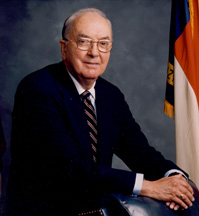
On the day GOP Senator Jesse Helms died, July 4, 2008, America celebrated with fireworks. As a longtime target of the senator’s hate tactics, I bought drinks for friends in San Francisco’s Castro.
My hate mail from Helms’s followers has diminished some over the years. After more than 20 years, the anonymous letters and “No Caller ID” calls still annoy me on my July 19 anniversary with Jesse Helms.
It was on that date in 1994 the North Carolina senator tried to fire me for “promoting the gay agenda” as a diplomat in the federal government. It was an action, recorded in the Congressional Record and on CSPAN, that depressed me, caused me to become suicidal, and sent me to the Dirksen Building with a long metal letter opener intending to stab Helms in the throat.
Fortunately, I couldn’t do it. I couldn’t attack Helms. I feared prison. I was imprisoned anyway with depression and the painful memories of the workplace tensions over being targeted by Helms.
“Forget you ever knew me,” one colleague told me. I forgot the chap alright. When he called to apologize a few years later, I could not recall his name and refused the favor he wanted of me.
In addition to fireworks, there was a torrent of terrible tributes to Jesse Helms upon his death of dementia. Here are a few of them:
Then-President George W. Bush said he and wife Laura were “deeply saddened by the passing of our good friend and a great American: Senator Jesse Helms.”
The Wall Street Journal called Helms “a hero of the Cold War.” The paper also said Helms “was no racist.” With so much YouTube and print evidence of racial insensitivity, this statement is laughable. The paper credited Jesse’s rise to power as “a reaction to the collapse of liberal governance.”
John Fund, writing in the Wall Street Journal, said Jesse Helms’s “career provides a blueprint for anyone who represents an embattled minority viewpoint.” Consciously or subconsciously, the LGBT community, especially those with Pink Mob mentality, may be emulating the divisive and offensive tactics Helms so proudly used to force his “old time backwoods values” on the nation.
The Washington Post published an editorial of a different tone” “Jesse Helms, White racist.”
WRAL, the Raleigh TV station, on July 5, 2008, said, “Throughout his long public career, Senator Jesse Helms was a tireless advocate for the people of North Carolina, a stalwart defender of limited government and free enterprise, a fearless defender of a culture of life, and an unwavering champion of those struggling for liberty.”
WRAL continued, “Jesse Helms was a kind, decent, and humble man and a passionate defender of what he called ‘the Miracle of America’. So it is fitting that this great patriot left us on the Fourth of July.”
Helms, who I first met in 1976 in Kansas City at the GOP National Convention, was not “kind, decent, humble, or compassionate.” He was a bigot.
Raleigh resident Patsy Clarke wrote Helms a letter in June 1995 after he implied people who died of AIDS deserved what they got. She asked him not to pass judgment on people as her gay son died of AIDS in 1994 at 31.
In his response, Helms told Clarke he didn’t judge homosexuality, “the Bible did.” He callously told Clarke her son “played Russian roulette with his sexuality.”
Helms enjoyed his nickname “Senator No” because he never saw a federal program he liked – except the deadly tobacco program he wholeheartedly supported to enrich for his state’s tobacco farmers at a huge toll to human suffering in the U.S. and around the world.
Smoking is a huge problem in the LGBT community as I have witnessed from attending smoking cessation programs at LGBT community centers and churches around the country. Consider this: Jesse Helms would want you to smoke so you could develop a smoking related illness and shorten your life.
On July 4, 2015, Jesse Helms Freedom Day, the LGBT community is free from the heavy burden of bigotry Helms so proudly threw at us for decades. Free yourself this year from the burden of smoking and help end the rich tobacco economy in North Carolina that Jesse supported while he denied funds to fight AIDS and legislatively delayed marriage equality and the Employment Nondiscrimination Act.
By doing this the LGBT community of 2015 can hasten the end of the Helms legacy and the one federal program he strongly valued, the tobacco program, and for which he was always “Senator Yes.”
Human Rights Advocate Jim Patterson is a writer, speaker, and lifelong diplomat for dignity for all people. In a remarkable life spanning the civil rights movement to today’s human rights struggles, he stands as a voice for the voiceless. A prolific writer, he documents history’s wrongs and the struggle for dignity to provide a roadmap to a more humane future. Learn more at www.HumanRightsIssues.com











